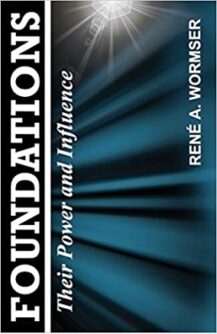
In 1953, the U.S. House Select Committee to Investigate Tax-Exempt Foundations and Comparable Organizations was formed to investigate the activities and expenditures of tax-exempt nonprofit organizations, including grantmaking foundations. Known as the Reece Committee because of its chairman, Rep. B. Carroll Reece of Tennessee, it released its findings in 1954. It caused quite some controversy; some considered it conspiratorial, consistent with the then-contemporary McCarthyism.
Reece Committee general counsel René A. Wormser’s 1958 Foundations: Their Power and Influence essentially defended and explained the committee’s work and its findings. An excerpt from the estate-planning and tax lawyer’s introduction to his book is below.
One cannot arrive at a quantitatively correct description of all foundations from examination of a selected number. Consequently, the investigator must be satisfied with an opportunity to arrive at conclusions regarding possible merits and demerits of foundation practices by examination of a reasonably large number of cases. The result will be a better understanding of the principles of human behavior involved in operating tax-exempt activities and a more practical approach to the formulation and application of the law protecting public interest.
Limited as it was by time and money, the Reece Committee could attempt only a partial investigation of some of the less desirable features of foundation management in the United States. Its main contribution was to expose instances in which the promotion of political ends, favored perhaps by foundation managers, had been disguised as charitable or educational activity. Political activity of this kind endangers the future of the foundation as an institution.
The often stormy hearings of the Reece Committee stimulated a widespread reexamination of the goals and methods of the major foundations. In the resulting public discussion, even some of the most stalwart supporters of the criticized foundations were obliged to admit certain deficiencies; indeed some major changes in personnel and in operating principles ensued.
The following pages are offered as a contribution towards a better understanding of the public issues arising out of the existence of powerful tax-exempt institutions. They point to some of the abuses of the past to illustrate the dangers inherent in the absence of effective measures for preventing political activity by foundations.